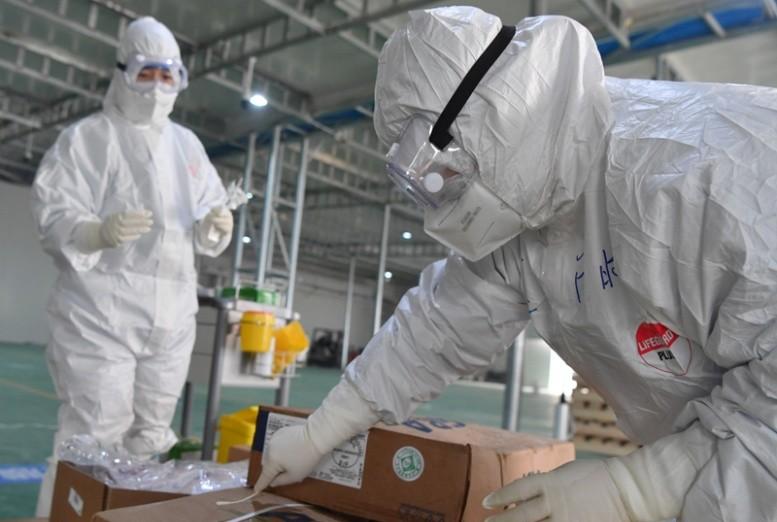Source: Health Times reporter Tan Qixin
According to the latest report of the Beijing Municipal Health Commission, since January 15, Beijing has reported a total of 71 local cases of new crown pneumonia, of which 65 cases of the Delta variant are related to the epidemic.

On January 22, medical staff conducted sampling of the outer packaging of imported cold chain food. Xinhua News Agency reporter Li Jiannan /Photo
It is worth noting that according to the public circulation information combing found that 39 of the Delta transmission chain infected people who have been found are cold chain practitioners, of which 31 cases are associated with cold storage in the southwest suburbs of Fengtai District, some are cold storage administrators, some operate cold chain products, and many people's daily life work intersects, including living together, eating together, sharing toilets, etc.
In addition, according to comprehensive local reports, the current round of epidemics in Beijing has spilled over to 4 provinces and 7 places in Shandong Jinan, Shandong Liaocheng, Shanxi Datong, Hebei Xiong'an, Hebei Baoding, Hebei Langfang, Liaoning Shenyang, etc., and the infected people found have cold chain contact experience.
"The Delta strain-related epidemic is currently in the development stage, the transmission chain is basically clear, and the cases found are directly or indirectly related to cold chain items or related practitioners." Pang Xinghuo, deputy director of the Beijing Municipal Center for Disease Control and Prevention, said at the press conference.
Why is the cold chain easy to become a relatively weak link in prevention and control?
"After entering the winter, the problem of the cold chain will be more prominent, which is mainly related to the natural factors of virus characteristics in low temperature environments." Liu Jue, a researcher at the Department of Epidemiology and Health Statistics at the School of Public Health of Peking University and a member of the National Health Commission's National Expert Group on Novel Coronavirus Pneumonia, told Health Times.
Based on global COVID-19 data, Liu Jue's research group found that for every 1°C decrease in temperature, the number of patients increased by 0.3%, which also explained the natural reasons for the aggravation of the epidemic in winter. In addition, the low temperature weather in winter will constitute a natural "cold chain" environment, which can trigger "material transmission to human" to "human-to-human transmission" under certain conditions, increasing the risk of transmission and increasing the difficulty of prevention and control.
"It has been observed that the new crown virus can survive for up to 21 days in a low temperature environment. In the environment of low temperature, high humidity and poor ventilation, contaminated cold chain items may become the carrier of the new crown virus, and relevant practitioners may be infected due to frequent contact with high-load contaminated cold chain items, if the protection is improper, there is a risk of infection, resulting in the spread of the virus. Liu Jue said.
Experts recommend strengthening the prevention and control of cold chain practitioners
On January 25, at the nucleic acid testing site of the second community in Xili, Majiapu Street, Fengtai District, Beijing, staff took nucleic acid samples for residents. Xinhua News Agency reporter Tang Rufeng /photo
Up to now, Beijing has 1 high-risk area and 6 medium-risk areas. One of the high-risk areas and five medium-risk areas are located in Fengtai District, Beijing.
As a key area of the epidemic in Beijing, Fengtai has now entered a state of emergency response for epidemic prevention and control. According to the latest news from the Fengtai District Leading Group for Epidemic Prevention and Control, since January 23, Fengtai District has completed two rounds of regional nucleic acid screening, and the third regional full nucleic acid screening has been launched.
Practitioners who are frequently exposed to cold chain products are the key groups for prevention and control. Liu Jue suggested that for those engaged in the loading and unloading of imported cold chain goods, processing, storage and transportation, sales and other positions, strengthen the occupational protection and health monitoring of employees, ensure the high coverage rate of new crown vaccination and regular nucleic acid screening of employees; at the same time, regularly carry out external environmental monitoring and disinfection of ports and places of transportation, processing, storage and sales of imported cold chain goods.
"At present, the epidemic situation in many places is sporadic, which is a common form of normalized epidemic. In the global state of the new crown pneumonia pandemic, the mainland has always faced a greater risk of importation from abroad, coupled with the fact that winter is more conducive to the survival and spread of the virus, the mainland's epidemic prevention and control is facing greater pressure, and the spread of the epidemic at multiple points is difficult to avoid, but it is generally controllable. From past experience, even in the face of new mutants with stronger transmission, the mainland can basically quickly control cluster epidemics within the longest incubation period of 1-2. I am also very confident that Beijing can also control the epidemic in a relatively short period of time. Liu Jue said.